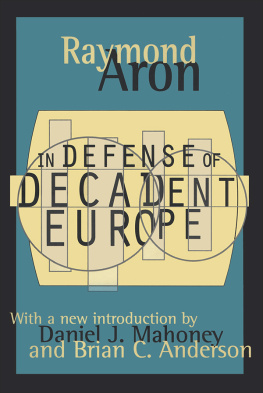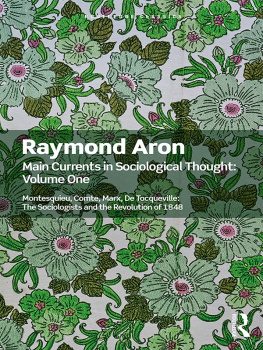Originally published in 1979 by Regnery/Gateway, Inc.
Published 1996 by Transaction Publishers
Published 2017 by Routledge
2 Park Square, Milton Park, Abingdon, Oxon OX14 4RN
711 Third Avenue, New York, NY 10017
Routledge is an imprint of the Taylor and Francis Group, an informa business
New material this edition copyright 1996 by Taylor & Francis.
All rights reserved. No part of this book may be reprinted or reproduced or utilised in any form or by any electronic, mechanical, or other means, now known or hereafter invented, including photocopying and recording, or in any information storage or retrieval system, without permission in writing from the publishers.
Notice:
Product or corporate names may be trademarks or registered trademarks, and are used only for identification and explanation without intent to infringe.
Library of Congress Catalog Number: 95-50133
Library of Congress Cataloging-in-Publication Data
Aron, Raymond, 1905-
[Plaidoyer pour lEurope decadente. English]
In defense of decadent Europe / Raymond Aron ; translated from the French by Stephen Cox ; with a new introduction by Daniel J. Mahoney and Brian C. Anderson.
p. cm.
Originally published: South Bend, Ind. : Regnery/Gateway, 1979.
Includes bibliographical references and index.
ISBN 1-56000-894-6 (pbk. : alk. paper)
1. Europe, WesternEconomic conditions1945- . 2. CommunismEurope, Western. 3. Europe, WesternSocial conditions. I. Title.
HC240.A83513 1996
330.96dc20
95-50133
CIP
ISBN 13: 978-1-56000-894-1 (pbk)
Contents
Marx, critic and prophet
The confrontation of the two Europes
The great fear of 1973; themes of self-criticism
For Laure, Alain and Pauline who will see how the story ends.
Introduction to the
Transaction edition
Raymond Arons In Defense of Decadent Europe was first conceived at a time of great uncertainty for the Western democracies. The postwar economic boom had been interrupted by stagflationa combination of high unemployment and inflationwhile Communist and Socialist parties in Italy and France were on the ascendant. A certain malaise had descended on the prosperous democratic world, which appeared less and less capable of collective action, riven with social conflict, and apprehensive of the future. Post-Marxist intellectual currents in the West carried antinomian theories dominated by anticapitalism and an extreme, even irrationalist libertarianism. At the same time the liberal democracies were exhibiting these symptoms of decadence the Red Army was poised, as ever, on European borders, inexorably arming itself and continuing its manipulation of left-wing groups and peace organizations throughout the West.
It was against this background that Aron was asked in 1975 by Jean-Franois Revel, one of the editors of the French series Liberts 2000, to write a defense of political and economic liberty that would demonstrate the superiority of the liberal democracies over the Soviet-styled regimes of the Eastern bloc. The editors were not entirely happy with what they received. As Aron indicates in his introductory comments to the book, finding a title was not easy. Inspired by his friend Fr. Gaston Fessard, S.J., who had written thirty years earlier two books anticipating Arons central argumentFrance, Beware Your Freedom and France, Beware Your Soulhe wavered between two titles: In Defense of Decadent Europe and In Defense of Liberal Europe.
The ambivalence Aron displayed in choosing a title was revealing, and it haunts his book. For all of their superiority in every imaginable category of economic measurement, for all of their unprecedented liberties, the regimes of the West were lacking Machiavellian virt: The capacity for collective action and historical vitality. If a sign of historic vitality for a political regime is the ability to recognize an enemy, and defend against its incursions, the liberal democracies were indeed decadent, and their survival was not assured. They were threatened with losing what political philosopher Pierre Manent has called the instinct for political existence. The revolution of 1989 in the East of Europe would not have fundamentally assuaged Arons concerns. The defeat of communism, although inspired by the example of the liberty and prosperity of the democracies, had little to do with the virt or sense of moral purpose of the democracies. It was evidence, rather, that the imperfection of the peoples democracies was essential in character and their decadence beyond amelioration.
Arons task in writing In Defense of Decadent Europe, then, was threefold: first, the analysis of the Soviet regime and the Marxist-Leninist theoretical foundation of that regime; second, the detailed empirical comparison between the liberal democracies and the collectivist regimes of the East; and finally, the exploration, Tocquevillian in inspiration, of what might be termed, the problem of democracythe tendency of the democratic regime to undermine itself unless checked in its most extreme tendencies. The second of these themes is, as the reader will discern, somewhat dated, although Arons empirical work (he was assisted by the French economist and editor Jean-Claude Casanova) is a model of dispassionate rigor. The first and third, however, remain of vital interest, making In Defense of Decadent Europe a permanent contribution to political thought as well as a model of civic education. Let us briefly touch on these two themes.
The challenge of ideoeraey
It is now widely recognized that the witness of the so-called Soviet dissidents had a profound impact on French intellectual and political life. It shook the self-confidence and challenged the spiritual hegemony of what Aron has called European Leftism. It was Aleksandr Solzhenitsyns Gulag Archipelago in particular that forced many in France to reconsider long-standing prejudices about the fundamentally progressive character of the Marxist-Leninist regimes and, indeed, socialist ideology itself. Perhaps the best known example of this impact was the emergence of the New Philosophers, former radicals of the 1968 generation who broke with their Marxist or Maoist pasts, loudly proclaimed their disillusionment with progressivism in all of its forms, and were propelled to various levels of fame and journalistic preeminence.
While welcoming their escape from juvenile leftism, Aron was far from overwhelmed by the New Philosophers. They engaged in facile denunciations of progress, condemned modern civilization in blanket fashion, and tended to reduce complex questions of political philosophy to slogans easily absorbed by the press. In their philosophical works, they were prone more to posturing or emotional appeals than to serious intellectual analysis or textual exegesis. If the New Philosophers were the most visible example of the effect that Solzhenitsyn had in shaking the confidence of European leftism, Arons In Defense of Decadent Europe is the most serious and sustained account of the moral, spiritual, and intellectual encounter between the dissidents and West European Marxism.











